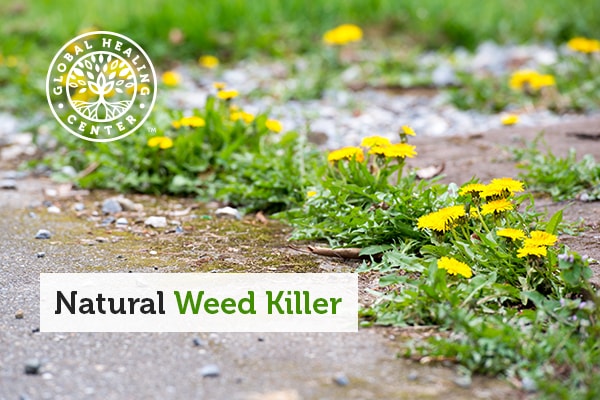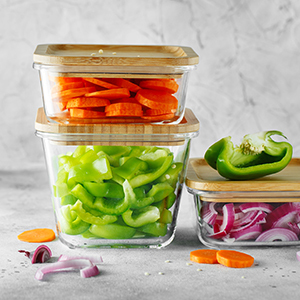
It's a common frustration: You've spent a warm, sunny day working in your garden, dutifully tilling the earth and planting seeds at just the right depth and distance — and then the next week, you go outside to find a crop of happy little dandelions enjoying your perfectly primed dirt. Of course, your first instinct is to destroy the invaders. So you get out your weed killer to take those dandelions to task.
Wait. Do you know what's in that weed killer? If it's full of chemicals that you can't pronounce, put it back on the shelf! There are many natural options you can use instead, and you probably already have some of them in your house.
Why Is Natural Weed Killer Better?
For a green, healthy lifestyle, using chemical weed killers isn't the best choice. Not only are they harmful to your environment and your health, but you can accidentally harm the rest of your plants and the surrounding soil.
Natural alternatives won't have any of the harsh chemicals found in commercially available products.
Options to Kill Weeds Naturally
While pulling weeds by hand is generally the best solution to control any pesky plant concern, not everyone can or wants to labor on their hands and knees all day, digging rubbish out of the garden. Plus, it's just not as easy with small plants that travel, like clover and crabgrass. You can try any of these more practical options to make weeding easier while maintaining an all-natural approach.
Cut 'Em Down
Here's a pro tip — set your lawnmower blade height to three-and-a-half to four inches. Cutting your grass higher keeps weeds at bay and grows a lush lawn that's perfect for barefoot walking. When you mow high, you aren't allowing "scalping," or damage caused by cutting the grass too short — this can lead to brown patches with no grass at all. You're also allowing the grass to grow a more extensive root system, which gives weeds less space to take over. When the grass is longer, it casts more shade on the soil, essentially blocking out the sunlight for any weeds that want to try and take hold.[1] Additionally, if you have a bag attachment, use it. Removing the clippings prevents seeds from being spread throughout the lawn.
Use Vinegar
The United States Department of Agriculture wanted to find out if vinegar (acetic acid) is effective at killing weeds, so they commissioned a study to find out. They determined that hand-spraying weeds with a five to ten percent acetic acid concentration generally killed weeds within two weeks of them taking root. The higher concentration of 10 percent killed most weeds at every growth stage 85 to 100 percent of the time.[2] Older weeds or those with long taproots may require a higher concentration — up to 20 percent. All you have to do is add white vinegar to a spray bottle and spray the weed, completely covering the visible portion. Note that household vinegar is typically four to seven percent acetic acid, so several applications might be necessary.
Burn Them
Burning weeds is also called "flame weeding." By hitting weeds with an intense burst of heat, but not actually setting them on fire, their cellular structure is damaged. This isn't an immediate solution as burned weeds don't disappear right away. Often, they take a few days to wilt and die. Employing this technique isn't hard, but dealing with fire requires extreme caution. So, while being very careful, take a handheld torch and run the flame over each weed a couple of times. Don't set them on fire, just burn them a bit. Repeat the process every few days for a couple of weeks.[3]
Cover Them With Mulch or Straw
Mulching your soil has some great benefits. It moderates soil temperature and keeps it moist, provides your plants with nutrients, and keeps away the weeds. There are different materials you can use for mulch. I recommend wood chips, straw, leaves, or grass clippings. Alternatively, you can try fabric or newspaper. Avoid plastic because it can break down and release toxic chemicals into the soil. You can get started by putting a layer of newspaper down on your garden beds with holes cut out for the plants you want to grow. The paper will hold moisture to keep your plants healthy, and it will decompose and feed the soil.[4] Cover it with three to six inches of organic mulch.
Use Boiling Water
Using boiling water to kill weeds is so effective that one farming manufacturer developed a special type of machinery to do just that. It tows behind a tractor and sprays hot water onto the soil instead of herbicides. The machine reportedly works every time.[5] You don't have to be a farmer to do something similar — pouring boiling water over weeds will destroy them, all the way down to the roots. But, it will also kill any other plant it touches. This method is particularly effective for cracks in sidewalks and driveways. Simply boil water in a kettle and spot-pour it onto weeds that are invading your lawn or garden. Be careful to only apply to weeds and not plants you want to keep. For weed control on larger patches, boil a pot of water on the stove and pour it over the area.
Throw Some Shade
Most weeds have to have sunlight, and they can often outcompete ornamental plants. So, if you cut off their source of the sun, they will eventually lose out to your favored plants. Just cover them with a light-blocking material like newspaper or fabric. Weigh it down with stones. For weeds that have already grown high, cover them from above to block out the sunlight. For example, get a pair of step stools and drape a tarp across them to provide strong shade. Fair warning — shading weeds might be the most time-consuming process!
Use Salt
Have you ever heard the phrase "salt the earth?" It's a good way to make sure nothing grows on that patch of land ever again — least of all, weeds. Salt is a natural desiccant, meaning it dries things out. Putting salt on weeds pulls the moisture right out of the plant, essentially sucking it dry until there's nothing left for it to drink. Just be careful to salt weeds that are far away from anything you'd like to keep growing.[6] Just apply salted water over the weeds you want to kill, using at least a 1:3 ratio of salt dissolved in the water. This is best for weeds in isolated spots, like sidewalk cracks, and could be too aggressive for areas like the garden where weeds are in close proximity to desirable plants.
Natural Weed Killer Recipes
To naturally get rid of weeds creeping around your yard and garden, you don't have to use harsh chemicals or a landscaper. Everything necessary can be had with a quick trip to the grocery store. These three inexpensive homemade recipes are effective and easy to make. For each, just mix all the ingredients in a one-gallon handheld sprayer — it should have a long nozzle and a manual air pump. You can find them at most hardware stores. Use the nozzle to target-spray the weeds.
Recipe 1
- 1 gallon vinegar
- 1 cup boric acid laundry detergent additive (Borax is the most common brand; it's available at most grocery stores)
- 1 tablespoon natural dish soap, which acts as a surfactant
Recipe 2
- 1 gallon vinegar
- 1 cup Epsom salt
- 30 drops clove essential oil
- 20 drops pine essential oil (optional)
Recipe 3
- 4 ounces citrus oil with d-limonene (liquid concentrate of d-limonene is available online or at some health food stores)
- 15-ounce bottle lemon juice (available at most grocery stores for a few dollars)
- 12 cups water
Commercial Weed Killer Ingredients to Avoid
Many commercial pesticides, weed killers, and herbicides — most notably, Roundup — contain glyphosate. A debate has been had about whether or not this chemical causes cancer. The Environmental Protection Agency has said that glyphosate is unlikely to cause cancer when used as directed.[7] But according to the International Agency for Research on Cancer, glyphosate is a probable carcinogen, and it's also genotoxic, meaning it changes DNA.[8] Not only that, but studies have also found that the "inactive" ingredients in Roundup may be more toxic than glyphosate.[9] Other chemical herbicides to avoid include atrazine, diquat dibromide, picloram, 1,4-dioxane, 2,4-Dichlorophenoxyacetic acid, and more. Bottom line — skip the toxic chemicals altogether and use natural methods.
Points to Remember
Introducing harsh chemicals into your garden to kill weeds will have negative effects on your other plants and your health. Using natural methods to kill weeds is better because they're effective without being toxic. For additional ideas, check out our organic gardening tips article! And, if you're seeking advice for dealing with garden pests, take a look at our article about organic pesticides.
References (9)
- Smitley D. Mow High for Weed and Grub Control. Michigan State University Extension. Updated 8 Feb 2013. Accessed 7 Feb 2019.
- Comis D. Spray Weeds with Vinegar? United States Department of Agriculture. Updated 15 May 2002. Accessed 7 Feb 2019.
- Grubinger V. Flaming Stale Seedbeds for Weed Control. University of Vermont Extension. Updated May 2004. Accessed 7 Feb 2019.
- Mackenzie A. The Best Types of Mulch for Weeds. SF Gate. Accessed 7 Feb 2019.
- Machine Uses Boiling Water to Kill Weeds. FARM SHOW Magazine. Accessed 7 Feb 2019.
- Patterson S. Salt Recipe for Weeds – How to Use Salt to Kill Weeds. Gardening Know How. Updated 4 Apr 2018. Accessed 7 Feb 2019.
- EPA Releases Draft Risk Assessments for Glyphosate [news release].17 Dec 2017. Washington,US Environmental Protection Agency. Accessed 18 Mar 2019.
- IARC Monograph on Glyphosate. International Agency for research on Cancer, World Health Organization. Accessed 18 Mar 2019.
- Mesnage R, et al. Major pesticides are more toxic to human cells than their declared active principles. Biomed Res Int. 2014;2014:179691.
†Results may vary. Information and statements made are for education purposes and are not intended to replace the advice of your doctor. If you have a severe medical condition or health concern, see your physician.







